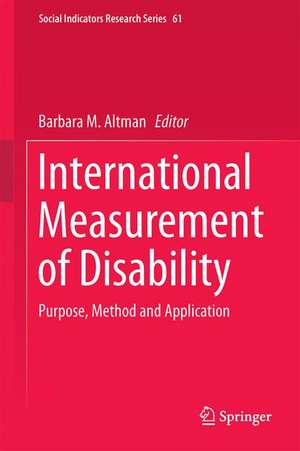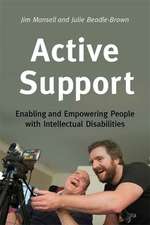International Measurement of Disability: Purpose, Method and Application: Social Indicators Research Series, cartea 61
Editat de Barbara M. Altmanen Limba Engleză Hardback – 21 iun 2016
| Toate formatele și edițiile | Preț | Express |
|---|---|---|
| Paperback (1) | 845.76 lei 6-8 săpt. | |
| Springer International Publishing – 31 mai 2018 | 845.76 lei 6-8 săpt. | |
| Hardback (1) | 852.86 lei 6-8 săpt. | |
| Springer International Publishing – 21 iun 2016 | 852.86 lei 6-8 săpt. |
Din seria Social Indicators Research Series
- 15%
 Preț: 601.13 lei
Preț: 601.13 lei - 5%
 Preț: 861.64 lei
Preț: 861.64 lei - 18%
 Preț: 945.47 lei
Preț: 945.47 lei - 15%
 Preț: 644.30 lei
Preț: 644.30 lei - 18%
 Preț: 959.50 lei
Preț: 959.50 lei - 15%
 Preț: 645.60 lei
Preț: 645.60 lei - 18%
 Preț: 1234.94 lei
Preț: 1234.94 lei - 15%
 Preț: 640.06 lei
Preț: 640.06 lei - 15%
 Preț: 635.47 lei
Preț: 635.47 lei - 5%
 Preț: 1105.21 lei
Preț: 1105.21 lei - 15%
 Preț: 646.11 lei
Preț: 646.11 lei - 18%
 Preț: 1233.06 lei
Preț: 1233.06 lei - 18%
 Preț: 953.03 lei
Preț: 953.03 lei - 5%
 Preț: 1101.37 lei
Preț: 1101.37 lei - 15%
 Preț: 644.82 lei
Preț: 644.82 lei - 18%
 Preț: 948.92 lei
Preț: 948.92 lei - 15%
 Preț: 642.51 lei
Preț: 642.51 lei - 18%
 Preț: 954.45 lei
Preț: 954.45 lei - 18%
 Preț: 1235.76 lei
Preț: 1235.76 lei -
 Preț: 407.56 lei
Preț: 407.56 lei - 15%
 Preț: 642.83 lei
Preț: 642.83 lei - 18%
 Preț: 955.70 lei
Preț: 955.70 lei - 15%
 Preț: 644.49 lei
Preț: 644.49 lei - 18%
 Preț: 952.89 lei
Preț: 952.89 lei - 15%
 Preț: 648.89 lei
Preț: 648.89 lei - 15%
 Preț: 645.47 lei
Preț: 645.47 lei - 18%
 Preț: 1224.54 lei
Preț: 1224.54 lei
Preț: 852.86 lei
Preț vechi: 897.75 lei
-5% Nou
Puncte Express: 1279
Preț estimativ în valută:
163.19€ • 177.82$ • 137.52£
163.19€ • 177.82$ • 137.52£
Carte tipărită la comandă
Livrare economică 24 aprilie-08 mai
Preluare comenzi: 021 569.72.76
Specificații
ISBN-13: 9783319284965
ISBN-10: 3319284967
Pagini: 335
Ilustrații: XXX, 335 p. 21 illus., 18 illus. in color.
Dimensiuni: 155 x 235 x 21 mm
Greutate: 0.69 kg
Ediția:1st ed. 2016
Editura: Springer International Publishing
Colecția Springer
Seria Social Indicators Research Series
Locul publicării:Cham, Switzerland
ISBN-10: 3319284967
Pagini: 335
Ilustrații: XXX, 335 p. 21 illus., 18 illus. in color.
Dimensiuni: 155 x 235 x 21 mm
Greutate: 0.69 kg
Ediția:1st ed. 2016
Editura: Springer International Publishing
Colecția Springer
Seria Social Indicators Research Series
Locul publicării:Cham, Switzerland
Public țintă
ResearchCuprins
Dedication.- Introduction - Barbara M. Altman, Washington Group Secretariat.- I Origin of the Washington Group and Issues in Disability Data Collection.- 1 Background and Origin of the Washington Group: Improving the State of Disability Data - Julie D. Weeks, Washington Group Secretariat.- 2 Cross-national Issues in Disability Data Collection - Marguerite Schneider, South Africa.- 3 Processes and Milestones of Washington Group - Cordell Golden, Washington Group Secretariat.- II Census Questions: Purpose, Process and Testing.- 4 Purpose of an International Comparable Census Disability Measure - Barbara Altman, Washington Group Secretariat and Elizabeth Rasch, United States.- 5 Summary of Washington Group Question Evaluation Studies - Kristen Miller, United States.- 6 The Harmonized Joint Pilot Tests for 2010 Population Census Round in Latin American Countries: An Integration Experience - Alicia Berkovich, Brazil.- III Moving Forward: Extended Question Sets and Methodological Advances.- 7 Development of Disability Measures for Surveys: The Washington Group Extended Set on Functioning - Mitchell Loeb, Washington Group Secretariat.- 8 The Asian Testing Experience - Marguerite Schneider, South Africa and Andres Montes, Thailand.- 9 The Challenges of Conducting National Surveys of Disability among Children - Howard Meltzer, England.- 10 Building a “Module on Child functioning and Disability” - Roberta Crisalesi, Elena DePalma, Alessandra Battisti, and Children’s Workgroup, Italy.- 11 Cognitive Analysis on Survey Questions for Identifying Out-of-School Children with Disabilities in India - Daniel Mont, England, Sathi Alur, India, Mitchell Loeb, Washington Secretariat, Kristen Miller, United States.- 12 Developing Tools to Identify Environmental Factors as Context for Disability: A Theoretical Perspective - Barbara M. Altman, Washington Group Secretariat and Howard Meltzer, England.- 13 International Comparisons of Disability Prevalence Estimates: Impact of Accounting or not Accounting for the Institutionalized Population - Emmanuelle Cambois, Carol Jagger, Wilma Nusselder, Herman Van Oyen, Jean-Marie Robine, France.- IV Conclusions: Outcomes and Place of the Washington Group Measures in International Data.- 14 The Washington Group on the Improvement of Disability Statistics Globally: Perspectives from the Philippines - Romy Virola and Jessamyn O. Encarnacion, Philippines.- 15 International census/survey data and the short set of disability questions developed by the Washington Group on Disability Statistics - Mitchell Loeb, Washington Group Secretariat.- 16 Swift and systematic? Identifying and recording disability in forced migration - Mary Crock and Laura Smith-Khan, Australia.- 17 The Washington Group’s Contribution to Disability Statistics and a Look to the Future.- Jennifer Madans, Washington Group Secretariat.- 18 What if There Were No Washington Group? - Mary Chamie. and Judy Heumann, United States.
Notă biografică
Barbara M. Altman is a sociologist with a PhD from the University of Maryland. Retired from the National Center for Health Statistics, CDC, where she served as Special Assistant on Disability Statistics to the office of the Director, she also worked at the Agency for Healthcare Research and Quality on the Medical Expenditure Panel Survey. Prior to her work in the government, she served as Undergraduate Coordinator in the Department of Sociology at the University of Maryland. She currently serves as a consultant on disability statistics issues. She played a key role in the organization and development of the work of the Washington Group, an international group working under the auspices of the United Nations, to develop culturally compatible measures of disability for international use and still consults on that activity. Her disability research interests focus primarily on disability definition and measurement, financing and utilization of health care services by persons with disabilities, and disability among minority groups, particularly Native Americans. She is the author of numerous articles and book chapters on disability topics including the recent Disability and Health in the United States Chartbook, and currently is co-editor of the series Research in Social Science and Disability.
Textul de pe ultima copertă
This volume provides an informed review of the accomplishments of the Washington Group on Disability Statistics (WG) in the provision of international data and statistics on disability. It does so within the context of the UN Convention on the Rights of Persons with Disabilities. The volume includes a description of the development and testing of a short set of questions for Censuses, now used in approximately 29 countries and recommended in the U.N.’s Principles and Recommendations for Population and Housing Censuses: The 2020 Round, which includes disability as a core topic to be collected in censuses.
It discusses the experiences of several countries on the use of the WG questions and how this has impacted on national agendas in the area of disability. It follows the development and testing of an extended set of questions for use in national surveys other than censuses and examines the challenges of translation and the importance of generating comparable question sets indifferent languages and within different cultures. It studies the examination of cognitive testing techniques in a variety of countries, and presents the results of the first round of censuses in 2010 in countries using the six question set. The volume includes discussions of the new development of question modules on a broad range of child disability and functioning, and the environmental contexts of participation that are part of the current work of the WG. In addition, it contains a reflection on the use of the WG’s functionality approach to identifying disabilities by humanitarian agencies to identify disabilities in populations of displaced persons. A thoughtful conclusion addresses what the development of cross-nationally comparable data can mean for the improvement of circumstances for all persons with disabilities.
Caracteristici
Provides detailed information on functioning measures of disability to the statistical and research communities Proposes a model that could result in more comparable data on disability cross-nationally Provides extensive information about ongoing collaborative work with other groups and training sessions that are being provided around the world Develops both theoretical approaches (to environmental measures) as well as practical applications (using functioning approach to ascertain disability in current refugee crisis)

















